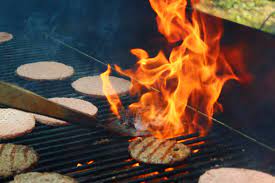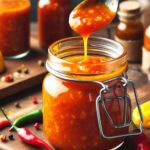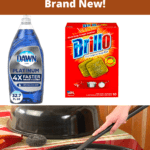We all love having a good barbecue. The food is satisfying, and the company is even better. There’s nothing like a great grill and some tasty food to enjoy with friends and family.
If you are here, I’m going to assume you may need to learn how to put out a grill fire if your fire got a little out of control.


The National Fire Protection Association (NFPA) predicts that there are over 10,000 fires at homes started by grills annually.
But accidents happen, and they can occur at any moment in time.
If you ever find yourself in the unfortunate situation of having a grill fire, here are some of the most common ways that grilling fires break out and how to quickly put out grill fire without a fire extinguisher.
What are Common Causes of Grill Fires?
Grill fires can be caused by many things. The most common causes include:
- The most common cause of grill fire is a grease fire
A grill grease fire is a type of cooking fire that happens when grease, which is usually in the form of animal fat, drips onto the coals, accumulates, and then overheats.
When the grease reaches a certain temperature, it will start to smoke and may ignite if there is a source of ignition.
This can happen when too much oil is used during cooking or if a food item has been left on the grates for too long.
- The grill is not properly secured
Outdoor grills are often placed dangerously close to railings and sheds, patios, decks and pose a serious fire hazard and should be at least 10 feet away from any structure.
- Flammable materials are too close to the grill
- Cooking or grilling equipment malfunctions
- Food has been left on the grill for too long
The most common cause of grill fires is that the food has been left on the grill for too long. This is due to a variety of reasons, but often someone will leave it on too long because they are distracted or they forgot about it.
Another common cause is that the coals have been extinguished and so there’s no heat to cook the food, but people think that they can still cook with a cover on.
The cover traps the heat from escaping and dries out the food, which then catches fire from one small spark.
- Foods that are too fatty and drip onto the heating element
- Grease buildup on the grill or heat shields
Not cleaning the grill or using too much lighter fluid when starting a new fire.
- The buildup of debris in the grill
Failing to clean out ashes from previous fires before starting the next one.
- Using an electric starter indoors, which can create static electricity and start a fire
How to Put Out a Grill Fire
A fire is one of the most dangerous things that can happen to your grill. You need to know what to do if this happens.
There are lots of ways to put out grill fire. The most important thing is to not panic and remember the following:
1. If you can reach the knobs, turn off the burners on a gas or propane grill.
If your gas grill catches fire, the first thing you should try to do is turn off the burners.
Turning the knobs off on a gas grill will stop fuel from feeding the fire and allow you to deal with things without them getting worse.
If the flames are too high or too close, turn off the gas and move the grill away from any outdoor furniture or other combustible materials.
Use a dish towel or oven mitt to move the grill completely away from any surface that could catch on fire.
2. Close the grill lid,
You can also close the grill lid to lower the oxygen level and help to cool the fire so that they don’t spread to other parts of your home.
3. Apply dirt, sand, or ash to smother the fire until it is out.
DO NOT USE WATER. You can use salt, baking soda, sand, or a blanket and smother a flame.
Use sand in an effort to douse the flames if they are close enough for you to reach them. Or use dirt or anything else that will not catch on fire when it comes in contact with the flames.
Note: If a propane tank is involved, leave the vicinity and dial the emergency services. Don’t use water to put out a grease fire or flare. As oil and water don’t mix, when a fire still burns, the water may create a lot of splashing and spread drops of burning oil to make the grease fire bigger. It’s important to remember that pouring water on a burning fire can produce steam, which can cause severe burns. The last thing you want to deal with is your grill being ruined because of water.
The best way is still prevention – keep an eye on your fire. If the grill fire is out of control and you have fire extinguished near by use it
10 Tips for Preventing Future Grill Fires While Grilling
Grill fires can be caused by inclement weather, gas grills, grease, or other sources. But no matter what the cause, it’s important to know how to prevent them.
The National Fire Protection Association (NFPA) and the American Barbecue Association (ABA) recommend these safety tips when using a charcoal or gas grill:
- Check all gas connections for leaks every time before igniting the grill.
- Keep your grill far away from anything that could potentially catch on fire. – Keep the grill away from buildings, tents, or other flammable materials.
- For charcoal grills, it is important that you don’t leave the grill unattended while cooking and keep children at least three feet away from the grill at all times.
- When cooking on a gas grill, it is also important to keep children away from the heat source and ensure that you have enough ventilation in your kitchen so that poisonous gases aren’t trapped.
- Use a lid to reduce to ashes and hot coals.
- Try not to leave the grill unattended and keep children and pets away from it. Place children’s play areas far away from it. Make sure they are at least 5 meters (16 feet) away, which is equal to 16 feet x 2 = 32 feet.
- Always use tools such as long tongs or spatulas when cooking with oil, butter, or sauces. This will prevent them from dripping on the open flame and catching fire.
- Keep an eye out for hot spots in your grill. This could indicate that there is an excess buildup of fat or charcoals, which increases.
- Never grill while smoking, near flammable materials, or while under the influence of alcohol or drugs.
- Keep a fire extinguisher nearby so that, in the event of an emergency, you can quickly deal with the flames.
Give your Grill Good care and clean it regularly
Give your grill good care and clean it regularly. Make sure to follow the rules outlined in the manufacturer’s instructions.
Make sure to regularly deep clean your grill including grill grates, tubes, and surface, etc. With this, your food will cook to perfection. Grills will last much longer and help you avoid the risk of a potential fire.
Grease can sometimes collect in the firebox area, which is around the burners. This may reduce efficiency and also create a risk of a dangerous grill fire.
Though the design should lead hot grease to a disposal pan, it can sometimes accumulate in high quantities and potentially start a fire.
If this happens, try to turn the gas off and leave the lid open so that any remaining grease can burn off.
Be sure to oil the food before grilling, not the grill grates.
Wrap Up – How to Put Out a Grill Fire
Grill fires can be quite troublesome, even if they are usually pretty simple to put out.
The best way to prevent and put out a grill fire is by taking the precautions we outline above. Also, make sure you’re paying attention to your grill! It will go a long way in making your grilling experience successful.
FAQ’s
Can you pour water on a grill fire?
It is not advisable to use water to put out grill fire.
When you pour water on a hot grill, it can cause burns due to the sudden release of steam and ashes out of the grill if you pour too quickly. delicate and fragile. Putting water on a grill fire may cause it to crack and lead to the whole grill becoming unusable.
One final downside of watering your barbecue is the mess! Watering the charcoal ash produces a gluey, goopy sludge that’s difficult to clean up. So by avoiding water on your briquettes during cooking.
A small water sprayer is a great way to temper a greasy fire. This is because the size of the water droplets they use can be very limiting when it comes to cooling.
Can you use baking soda to put out a grill fire?
Yes, you can use baking soda to put out a grill grease fire!
It’s a good idea to have a box of baking soda or two at home.
Baking soda is nontoxic and it is also cheap. You can find it in the laundry aisle, usually near the detergent.
Baking soda is often used to put out small grease fires. It can also neutralize the acid in the fire, which helps put it out.
Does flour put out a grease fire?
Flour is not effective at putting out a grease fire.
Flour is not an effective agent to put out a grease fire and should never be used for this purpose.
The best way to extinguish a grease fire is by using baking soda or salt.
The flour will not put out a grease fire because it does not absorb the fat on the surface of the pan or any on top of food on the grill or stovetop.
A better option is baking soda, which will put out a grease fire by smothering it and absorbing oil from its surface.
It can even put out an open flame that has spilled onto your stovetop and is burning some of your pots and pans.
If you don’t have baking soda around, then you can try using salt instead to put out a grease fire.
I am a writer, editor, and publisher of Grillcuisines.com – an online blog dedicated to sharing grilling tips, accessories, and recipes to encourage more people to get outside and grill.
I’m off to find out the different types of grill foods, their seasons, and how to conduct outdoor cooking properly. I’ll also show you some of my grill-worthy cooking tools & accessories!







